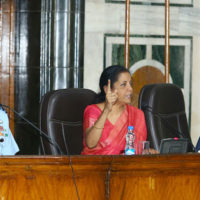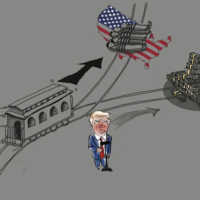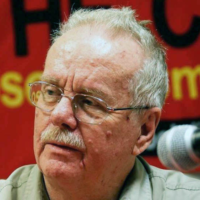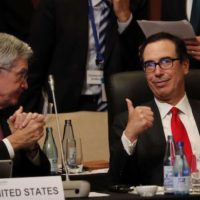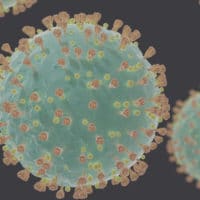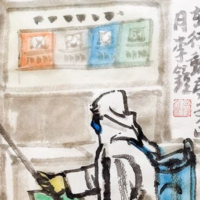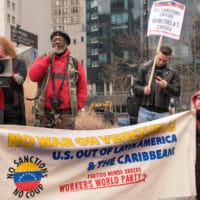-
Amid coronavirus crisis, China demonstrates that an alternative to the US-led, neoliberal order is possible
The bankruptcy of neoliberalism has been highlighted by the vastly different responses of the world’s two most powerful countries to the coronavirus pandemic.
-
Cuba sends doctors, nurses worldwide in COVID-19 fight
Cuba on March 28 sent a team of 39 doctors and nurses to Andorra, the thirteenth medical brigade the country has dispatched overseas to combat the COVID-19 pandemic.
-
A niggardly response to an extraordinary crisis
In a show of solidarity, some of India’s opposition leaders have declared the much-delayed relief package (titled Pradhan Mantri Garib Kalyan Yojana) announced by Finance Minister Nirmala Sitharaman on March 26 to mitigate the effects of the Coronavirus pandemic on the poor as a welcome “first step”.
-
All the craziest things about America are being highlighted by this virus
“Corona is a black light and America is a cum-stained hotel room,” comedian Megan Amram colorfully tweeted a couple of weeks ago. Her observation has only grown more accurate since.
-
‘For common benefit of all,’ Ireland nationalizes hospitals for duration of Coronavirus crisis, sparking demand for U.S. to follow suit
“How wonderful is this. A beautiful silver lining.”
-
Unsanitized: Bailouts, a tradition unlike any other
The money the Federal Reserve will give to corporate giants, approximately.
-
Ecosocialism or barbarism: an interview with Ian Angus
In an interview with roape.net, ecosocialist and writer Ian Angus discusses the environmental crisis, the Anthropocene and Covid-19. He argues that new viruses, bacteria and parasites spread from wildlife to humans because capital is bulldozing primary forests, replacing them with profitable monocultures. Ecosocialists must patiently explain that permanent solutions will not be possible so long as capital rules the Earth.
-
Has America reached its endgame in Afghanistan?
In an extraordinary statement titled “On the Political Impasse in Afghanistan,” Washington has admitted to the failure of Secretary of State Mike Pompeo’s mission to Kabul on March 23, which was taken up to heal the political rift among Afghan politicians and to urge them to form an inclusive government so as to implement the peace agreement signed in Doha on February 29.
-
The Federal Reserve’s Coronavirus crisis actions, explained (Part 2)
Hear comes the corporate debt purchases.
-
COVID-19 and Circuits of Capital
COVID-19, the illness caused by coronavirus SARS-CoV-2, the second severe acute respiratory syndrome virus since 2002, is now officially a pandemic. As of late March, whole cities are sheltered in place and, one by one, hospitals are lighting up in medical gridlock brought about by surges in patients.
-
Letter from Catalonia: Alarming measures
I’m in a small city in Catalonia called Olot, not far from the Pyrenees. I came here because I knew the coronavirus lockdown would be much rougher in Barcelona. Still, people walk around with masks and keep social distances, barely going out.
-
Democracy in Brazil would not be normal, Bolsonaro threatens
The far-right president hints that a regime more authoritarian than Chile’s Augusto Pinochet dictatorship could be the “price to pay” due to the “chaos” that the “small flu” triggers.
-
We won’t go back to normal, because normal was the problem
It is hard to remember that just a few weeks ago, the planet was in motion. There were protests in Delhi (India) and Quito (Ecuador), eruptions against the old order that ranged from anger at the economic policies of austerity and neoliberalism to frustration with the cultural policies of misogyny and racism. Ingeniously, in Santiago (Chile), during its wave after wave of protests, someone projected a powerful slogan onto the side of a building: ‘we won’t go back to normal, because normal was the problem’.
-
In light of the Global pandemic, focus attention on the people
SARS-CoV-2 or COVID-19, now declared a global pandemic by the World Health Organisation, has begun to wreak havoc in large parts of the world, with other parts waiting in anticipation. We are in a real struggle, which needs total mobilisation; a struggle that needs to put life before profit.
-
As the World tackles the COVID-19 pandemic, the U.S. raises the pressure on Venezuela
In a press conference on March 26, it was almost comical how little evidence the U.S. Department of Justice provided when it accused Venezuela’s President Nicolás Maduro and several of the leaders of his government of narco-trafficking. The U.S. offered $15 million for the arrest of Maduro and $10 million for the others. Maduro, U.S. Attorney Geoffrey Berman said dramatically, “very deliberately deployed cocaine as a weapon.” Evidence for this? Not presented at all.
-
Venezuela’s Coronavirus response might surprise you
Within a few hours of being launched, over 800 Venezuelans in the U.S. registered for an emergency flight from Miami to Caracas through a website run by the Venezuelan government. This flight, offered at no cost, was proposed by President Nicolás Maduro when he learned that 200 Venezuelans were stuck in the United States following his government’s decision to stop commercial flights as a preventative coronavirus measure.
-
Venezuela: U.S. blocks flights to repatriate citizens amid COVID-19
Arreaza reiterated that the request for humanitarian flights responds to a request made by Venezuelans themselves to the Venezuelan Attention System in the United States.
-
Unions welcome government’s decision to renationalise rail services
However it should not have taken a pandemic to bring rail back into public ownership, trade unionists say.
-
The Federal Reserve’s Coronavirus crisis actions, explained (Part 1)
The Federal Reserve has taken an extraordinary amount of actions over the past two weeks (most of which have happened over the course of 8 days from March 15th to March 23rd) to calm financial markets and sustain the flow of credit to households and businesses to respond to the coming Coronavirus-induced depression.
-
How market reforms made the NHS vulnerable to pandemics
A 2014 report warned that reforms to the NHS would make it vulnerable to pandemics – by making staff redundant, undermining public health and defining spare capacity as waste. It was ignored.



